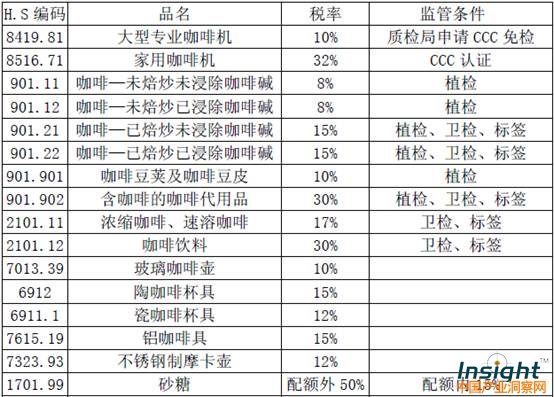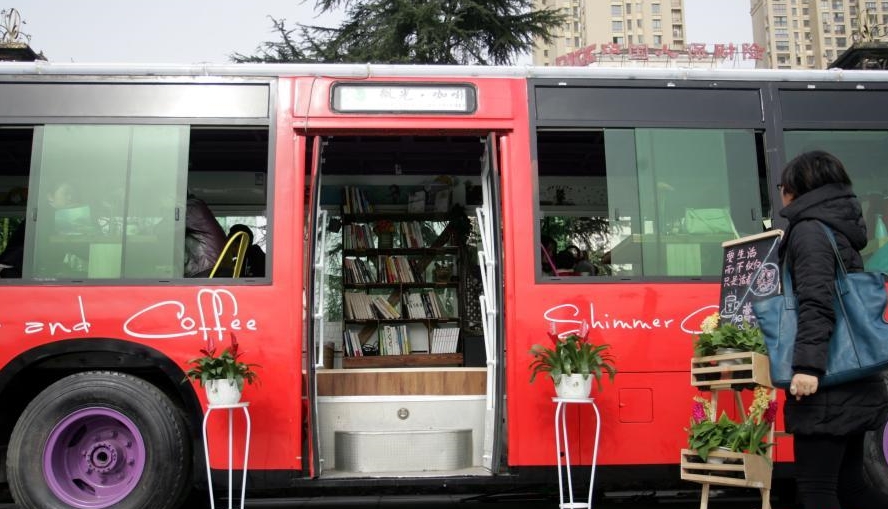Development trend of Coffee in China Coffee Industry Policy Analysis of Yunnan Coffee in China
According to the relevant laws of China, coffee beans and their peripheral products (except sugar) are free trade goods. The relevant policies and regulations related to China's import of coffee beans mainly include:
(1) Import tax rate and regulatory conditions
Related to its import tax rate and regulatory conditions. Professional coffee machine (boiler above 10 liters / excluding 10 liters) can apply for 3C exemption. The label belongs to the scope of commodity inspection, which stipulates that from March 1, 2001, all import and export food must be submitted for inspection with the Import and Export Food label examination Certificate.
The import of coffee beans also requires a customs clearance form for incoming goods. The customs clearance form of entry goods is the certificate of the state's permission to enter the country for the goods subject to entry inspection and quarantine. Since January 1, 2000, for the goods carrying out entry inspection and quarantine, the Customs clearance form for entry goods has been officially launched and a special seal for inspection and quarantine has been affixed to the customs form, among which coffee beans are listed.
(2) the process of importing coffee beans
Customs clearance procedures, also known as customs declaration procedures, refers to exporters or importers declare export or import to the customs, accept customs supervision and inspection, and perform the formalities prescribed by the customs. When the customs clearance procedures are completed and the taxes and other fees payable are settled, the goods can be cleared through customs with the consent of the customs. Customs clearance procedures usually include declaration, inspection, taxation, release and clearance.
Table 1: import tax rate and regulatory conditions of coffee beans

Source: coffee Bean Branch of China Fruit Circulation Association, 2013
China Industrial Insight Network is a brand under this research, providing customers with industry research, market research, competitor research, investment feasibility analysis and other services. Since its establishment in 2005, it has provided professional research services to more than a thousand state-owned enterprises, private enterprises and foreign-funded enterprises. With years of reputation to provide you with a feasible and accurate market analysis report.
China Industry Insight Network has been focused on coffee research for five years. We have 10 professional analysts in coffee who have followed coffee for a long time and accumulated a large number of data and research results. to ensure that our report is detailed, accurate and authoritative, covering a comprehensive penetration of the overall situation analysis of coffee, providing you with the most unique insights into coffee. The results of coffee research by China Industry Insight Network have been widely recognized by practitioners or investors in the industry.
Important Notice :
前街咖啡 FrontStreet Coffee has moved to new addredd:
FrontStreet Coffee Address: 315,Donghua East Road,GuangZhou
Tel:020 38364473
- Prev

Shanghai K11 turns into a coffee museum and teaches you to make coffee on the spot.
Lianshang.com news: from March 10th, Shanghai K11 will be transformed into a coffee museum, throughout the Art Mall coffee knowledge, all the favorite coffee brands will participate in various coffee courses, in addition to popularizing coffee culture, but also hope to bring you more creativity and inspiration in life! There will not only be an on-site hand-brewed coffee event, but also a wonderful
- Next

The bus cafes on the streets of Hubei are eye-catching
On March 3, 2015, a creative cafe transformed from a scrapped bus was unveiled on the banks of the Yangtze River in Yichang, Hubei province, attracting many young people to try something new. At the scene, the body of the modified bus was covered with red paint, and the car was equipped with five coffee tables, bookshelves, air conditioners and coffee making rooms.
Related
- What is the difference between Indonesian Sumatra Mantinin coffee and gold Mantinin? How to distinguish between real and fake golden Mantelin coffee?
- What does bypass mean in coffee? Why can hand-brewed coffee and water make it better?
- Unexpected! Ruixing Telunsu lattes use a smoothie machine to foam milk?!
- % Arabia's first store in Henan opens into the village?! Netizen: Thought it was P's
- Does an authentic standard mocha coffee recipe use chocolate sauce or powder? Mocha Latte/Dirty Coffee/Salty Mocha Coffee Recipe Share!
- What is the difference between Vietnam egg coffee and Norway egg coffee? Hand-brewed single product coffee filter paper filter cloth filter flat solution!
- What is the difference between sun-cured and honey-treated coffee? What are the differences in the flavor characteristics of sun-honey coffee?
- How to make Italian latte! How much milk does a standard latte use/what should the ratio of coffee to milk be?
- How to make butter American/butter latte/butter Dirty coffee? Is hand-brewed coffee good with butter?
- Is Dirty the cold version of Australian White? What is the difference between dirty coffee/decent coffee and Australian white espresso?

